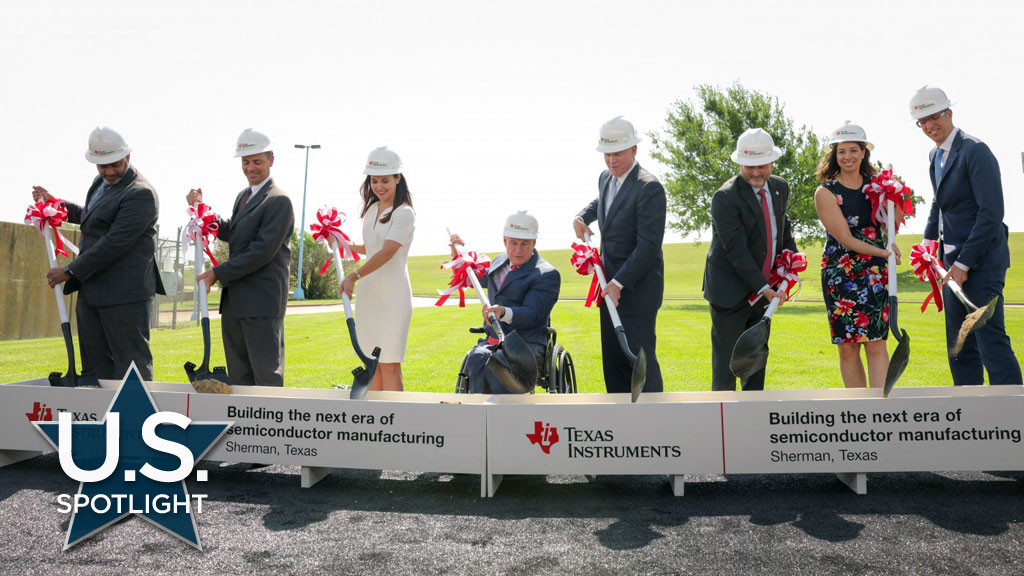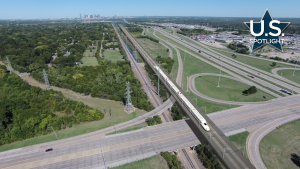The traditional image of Texas as a cattle-and-oil state has been cast aside over the past few decades. Today, Texas is a magnet for corporate relocation and new investment in all types of industry. Few have had as much impact on the state’s economic future as technology.
Passage of the CHIPS Act bill by the U.S. Senate is certain to accelerate technology investment in Texas even further and boost the construction industry by extension. More than $52 billion in subsidies and support will be available, plus billions more in additional tax breaks, for domestic semi-conductor manufacturing as part of a plan to repatriate production of critical technology.
The biggest names in the industry have discovered Texas and are making the state central to their future ambitions.
For example, every week there’s coverage surrounding the $17 billion Samsung microchip fabrication facility in Taylor, with the recent selection of Yates Construction as the project’s overall construction service provider.
Samsung may not be finished with their Texas tech expansion. As previously reported, and confirmed last month, the company is considering several potential additional “Fab” facilities in areas around Manor and Taylor. It is estimated these investments could result in nearly $200 billion of extra investment and over 8,000 jobs.
U.S. Commerce Secretary Gina Raimondo said in a statement that, “Samsung’s investment would be transformational for America’s domestic chip manufacturing industry, create thousands of good paying jobs and secure our ability to lead the world in 21st Century innovation.”
Korean-based Samsung is far from the only major tech investment established in the state or planning further expansion.
Texas Instruments (TI) broke ground in May on a $30 billion project that would ultimately encompass four semiconductor and wafer fabrication plants near Sherman.
“For more than 90 years, TI has been a member of the powerful ‘Made in Texas’ brand and we are proud that the company has chosen to continue its legacy of innovation in the Lone Star State,” said Governor Greg Abbott in a news release last November. “In addition to bringing billions of dollars in capital investment and thousands of new jobs to north Texas, this historic investment will keep Texas a national leader in semiconductor manufacturing while also strengthening the domestic semiconductor supply chain.”
Apple is hoping to annex 53 acres of land next to its new four-building campus in north Austin now nearing completion. Additional employment projections are as high as 15,000 new workers across three million square feet of offices and other amenities that could include a hotel. The Austin operations are already Apple’s largest outside California.
Also coming to Sherman is GlobiTech, a subsidiary of GlobalWafers Co. Ltd., and its $5 billion manufacturing facility and 1,500 jobs. And just north of downtown Austin, specialized tech manufacturer LTD Material LLC plans to add a 52,000 square foot expansion to its existing facility.
This is just the tip of the iceberg. In fact, in the Austin area alone, the Austin Chamber of Commerce reports that in 2020, nearly 30 companies associated with technology either relocated or expanded facilities in the immediate area.
Yet amid all this potential good news for the Texas economy on both a regional and state-wide basis, there are obstacles and resistance on a local level.
First is resistance to the corporate benefits resulting from Chapter 313 tax concessions. For example, Samsung and TI combined have already been the beneficiaries of over $2 billion in subsidies since 2008, according to Good Jobs First’s Subsidy Tracker.
Calculations by the Austin Business Journal suggest if Samsung’s latest plans reach fruition, “the company could save about $4.8 billion in property taxes over the course of the agreements.”
Such high levels of corporate support come at a cost to local education, some critics claim.
There is also the impact of massive investment and new job creation on the communities. Local representatives in Taylor wonder how many of the 10,000 or so new jobs will be available to current residents. An influx of new workers would of course require substantial infrastructure and commercial support, causing some long-time residents to express concerns that the character of their small communities will be irreversibly changed.
In the final analysis, such problems seem more good news than bad. Brandt Rydell, the mayor of Taylor, concedes although a few members of his council have voted against the Chapter 313 concessions, the potential for improved employment and economic expansion are being greeted with enthusiasm by the majority.











Recent Comments
comments for this post are closed